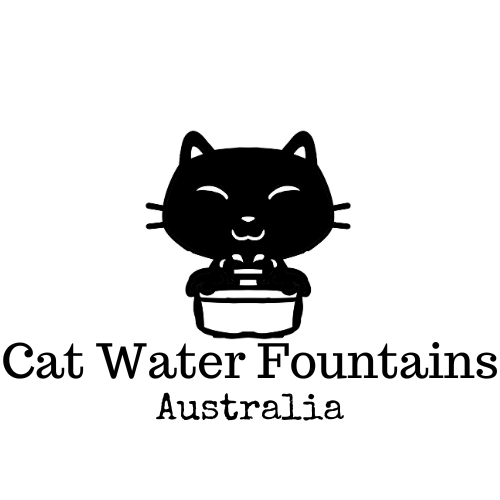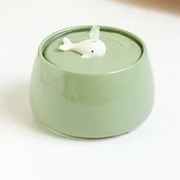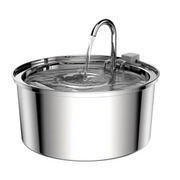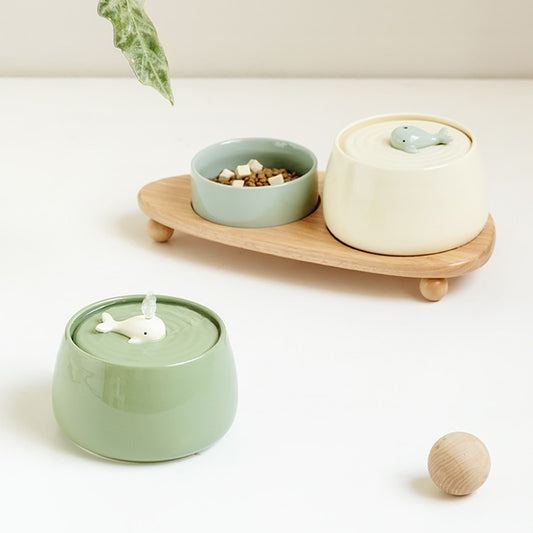Can Cats Safely Eat Cheese?
Cat Water Fountains Australia
Share This Article
As cat owners, we often find ourselves wondering whether our feline companions can partake in some of our favourite human foods. One common curiosity revolves around cheese. Can cats safely enjoy cheese as a treat? In this article, we will delve into the topic and uncover the truth about feline cheese consumption, exploring the nutritional implications, potential risks, and considerations associated with feeding cheese to cats.
Before we can determine whether cats can safely eat cheese, it's crucial to understand their specific dietary requirements. Cats are obligatory carnivores, meaning their bodies thrive on animal-based protein. They also require adequate amounts of fat and have minimal carbohydrate needs. Straying from these dietary needs can lead to health issues in cats, such as nutritional imbalances and obesity.
One common concern regarding cats and cheese stems from lactose intolerance. Like many mammals, cats often lack the enzyme lactase required to digest lactose, the sugar found in milk and dairy products. However, it's essential to note that lactose intolerance can vary from cat to cat, with some displaying higher tolerance levels.
In short, yes. However, the answer to whether cats can safely eat cheese depends on several factors. While cheese is a dairy product and contains lactose, some cats may tolerate small amounts of cheese without adverse effects. Factors such as age, breed, and overall health can influence a cat's ability to digest and process cheese.
Cheese offers certain nutritional benefits for cats. It is a good source of high-quality protein, essential for muscle development and overall body function. Cheese also contains fat, which provides energy, and various vitamins and minerals, including calcium, phosphorus, vitamin A, and vitamin B12. These nutrients are crucial for maintaining healthy bones, teeth, and organ function in cats.
While cheese can provide nutritional benefits, it's vital to consider potential risks and considerations. The high-fat content in cheese can contribute to weight gain and obesity in cats if consumed in excess. Additionally, some cats may be allergic to dairy products, leading to symptoms like skin irritation, itching, vomiting, or diarrhoea. Lactose-intolerant cats may experience digestive issues and gastrointestinal upset after consuming cheese.
If you decide to introduce cheese to your cat's diet, it is essential to consult with a veterinarian first. They can provide professional advice based on your cat's specific needs and health condition. When introducing cheese, start with small portions and closely monitor your cat for any adverse reactions. Gradual introduction allows their digestive system to adjust and helps identify any potential allergies or intolerances. Portion control is key, and cheese should only be given as an occasional treat, never as a staple food.
If cheese isn't suitable for your cat or you prefer alternatives, there are cat-friendly dairy products available, such as lactose-free milk or yoghurt specifically formulated for cats. Additionally, there is a wide range of other healthy and safe treats for cats, including freeze-dried meat, cooked chicken or fish, and commercially available cat treats. Adding variety to your cat's diet ensures they receive a balanced nutritional intake.
Cats can tolerate cheese in moderation, but it's crucial to consider their individual needs and potential sensitivities. While cheese can offer some nutritional benefits, it should never replace a balanced, species-appropriate
Understanding a Cat's Unique Dietary Needs
Before we can determine whether cats can safely eat cheese, it's crucial to understand their specific dietary requirements. Cats are obligatory carnivores, meaning their bodies thrive on animal-based protein. They also require adequate amounts of fat and have minimal carbohydrate needs. Straying from these dietary needs can lead to health issues in cats, such as nutritional imbalances and obesity.
Debunking the Myth: Cats and Lactose Intolerance
One common concern regarding cats and cheese stems from lactose intolerance. Like many mammals, cats often lack the enzyme lactase required to digest lactose, the sugar found in milk and dairy products. However, it's essential to note that lactose intolerance can vary from cat to cat, with some displaying higher tolerance levels.
Unravelling the Cheese Conundrum: Can Cats Safely Consume It?
In short, yes. However, the answer to whether cats can safely eat cheese depends on several factors. While cheese is a dairy product and contains lactose, some cats may tolerate small amounts of cheese without adverse effects. Factors such as age, breed, and overall health can influence a cat's ability to digest and process cheese.
Nutritional Value of Cheese for Cats
Cheese offers certain nutritional benefits for cats. It is a good source of high-quality protein, essential for muscle development and overall body function. Cheese also contains fat, which provides energy, and various vitamins and minerals, including calcium, phosphorus, vitamin A, and vitamin B12. These nutrients are crucial for maintaining healthy bones, teeth, and organ function in cats.
Potential Risks and Considerations of Feeding Cats Cheese
While cheese can provide nutritional benefits, it's vital to consider potential risks and considerations. The high-fat content in cheese can contribute to weight gain and obesity in cats if consumed in excess. Additionally, some cats may be allergic to dairy products, leading to symptoms like skin irritation, itching, vomiting, or diarrhoea. Lactose-intolerant cats may experience digestive issues and gastrointestinal upset after consuming cheese.
Safe and Responsible Cheese Introduction for Cats
If you decide to introduce cheese to your cat's diet, it is essential to consult with a veterinarian first. They can provide professional advice based on your cat's specific needs and health condition. When introducing cheese, start with small portions and closely monitor your cat for any adverse reactions. Gradual introduction allows their digestive system to adjust and helps identify any potential allergies or intolerances. Portion control is key, and cheese should only be given as an occasional treat, never as a staple food.
Cheese Alternatives and Supplementary Treats for Feline Delights
If cheese isn't suitable for your cat or you prefer alternatives, there are cat-friendly dairy products available, such as lactose-free milk or yoghurt specifically formulated for cats. Additionally, there is a wide range of other healthy and safe treats for cats, including freeze-dried meat, cooked chicken or fish, and commercially available cat treats. Adding variety to your cat's diet ensures they receive a balanced nutritional intake.
Navigating the World of Cheese for Cats
Cats can tolerate cheese in moderation, but it's crucial to consider their individual needs and potential sensitivities. While cheese can offer some nutritional benefits, it should never replace a balanced, species-appropriate









